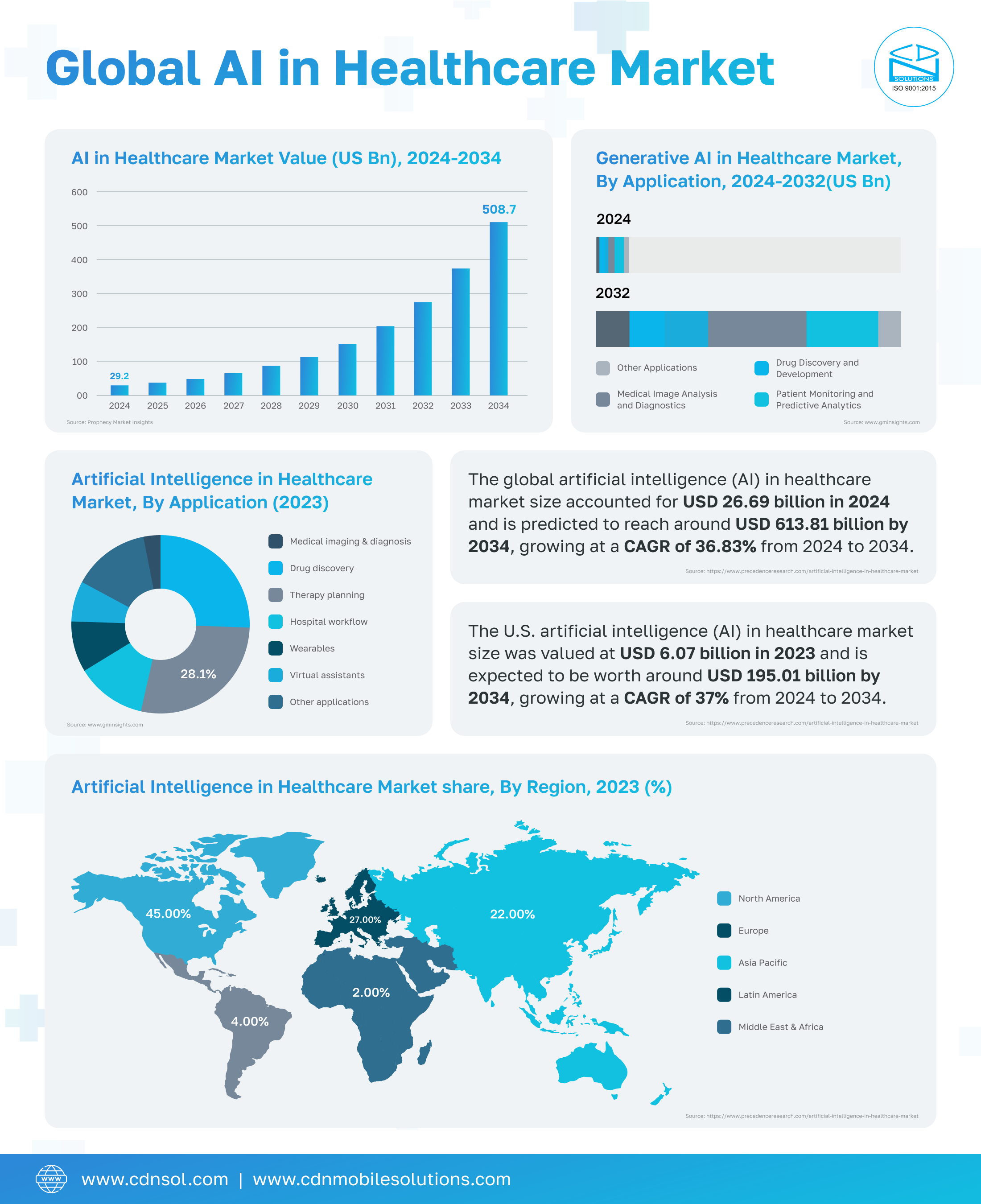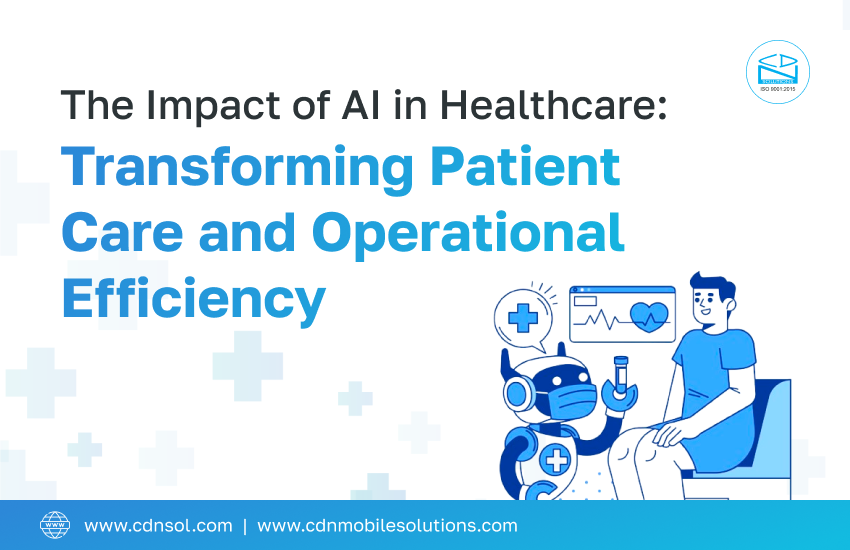AI has rapidly emerged as one of today’s most powerful technologies, promising to reshape many sectors including the healthcare landscape. AI in Healthcare Technology has presented enormous opportunities that could boost patient care and operational efficiency. It is redefining the future of the medical world. It transforms treatment, diagnosis, operations, administration, and future digital health systems. From AI-driven diagnostic tools to predictive analytics, AI applications in healthcare extend to personalized treatment plans.
AI in healthcare applies complex algorithms and machine learning models that mimic human cognition in analyzing, interpreting, and making sense of complex medical and health data. AI in health applications and platforms automates routine practitioner tasks, enhances the accuracy of diagnosis, elevates patient care, and informs data-driven decisions to improve health outcomes. AI healthcare benefits through reduced administrative burden and human error, and personalized. treatment plans.
Table of Contents
Use Cases of AI in Healthcare
AI in Diagnostic Precision
One of the biggest coups in diagnostic precision is the way AI can process large volumes of data with speed and accuracy. AI-powered tools now help healthcare providers identify patterns in medical images, like X-rays, MRI, and computed tomography scans, to make early detection of diseases related to cancer, cardiovascular conditions, and neurological disorders. Advanced algorithms at the heart of AI functionality deliver unparalleled detection of anomalies that might be concealed from the naked human eye, enabling diagnoses to be much faster and more precise than their traditional diagnostic counterparts. Things have reached such a pass that AI is becoming integral to medical practice, more so in radiology, pathology, and dermatology, where accurate diagnosis is everything.
AI Mastering the Art of Patient Care
The role of AI in patient care goes way beyond diagnostics; it’s changing how patients interact with health providers and, incredibly, even how treatments are carried out. AI healthcare applications are increasingly being used for the real-time monitoring of a patient so that physicians can offer personalized care with continuous data inputs. For instance, wearables driven by artificial intelligence can keep track of vital signs and raise alerts when an abnormality is detected to ensure timely intervention. It also powers telemedicine platforms, enhances patient engagement with virtual assistants, and automates routine care tasks such as appointment scheduling and follow-ups.
Operational Efficiency in Healthcare through AI
The use of AI improves not only clinical outcomes but also operational efficiency within healthcare systems. Hospitals and clinics deploy AI algorithms to manage resource allocation effectively by minimizing wait times and handling massive volumes of data. AI-driven administrative tools can automate routine tasks, such as managing patient records, billing, and scheduling, thereby freeing health practitioners to attend to their core roles of caregiving. Predictive algorithms can also be used by healthcare institutions in the forecast of patient volumes to manage staffing more appropriately and ensure better service delivery.
AI and Predictive Analytics in Healthcare
The role of AI-driven predictive analytics is getting much hype in healthcare because this will offer really powerful insights into patient outcomes, disease progression, and even healthcare trends. By studying past data, AI can predict outbreaks of diseases, readmission of patients, and complications that may arise. Predictive analytics also help in personalized treatment planning, optimization of prescription of drugs, and overall patient care. More and more AI health start-ups focus on harnessing this data to offer personalized health recommendations, improve clinical trials, and ensure better patient outcomes.
AI-Driven Drug Discovery and Development
Drug discovery and development have long been a time-consuming and cost-intensive process. However, AI is accomplishing wonders in the field by locating potential drug candidates much faster, ensuring swift testing, thereby reducing the time from concept to market. Machine learning models are being employed to study chemical compounds, predict the efficacy of drugs, and optimize clinical trials by identifying ideal patient groups. AI can process big datasets, hence helping pharmaceutical companies reduce the time a new drug takes to get to the market and at the same time minimizing the costs involved in developing the drug.
Ethical Considerations and Challenges of AI in Healthcare
With AI, while this is highly promising, it also raises several ethical issues and challenges. One of the biggest challenges involves privacy and security concerns for patient data. This is because AI systems require a large volume of data; a lot of this data involves sensitive information related to patients, which raises grave concerns about data breaches and misuse. Admittedly, the application of AI in healthcare will also raise questions on the replacement of human jobs, transparency in AI decision-making, and fairness in AI algorithms–probably biased based on peculiarities in training datasets.

Challenges in AI Healthcare Solutions:
- Privacy and security of data in AI-driven healthcare systems.
- Fairness and handling of biases in AI algorithms.
- Spectra of changes in the healthcare sector.
- Balancing human oversight with AI decision-making.
Future of AI in Healthcare
As AI continues to advance, its applications in health will continue to grow. AI-driven technologies will have a great impact on the future of digital health systems-from personalized medicine down to population health management. AI will be at the very core of the future of medicine, preventing diseases as much as treating them. Looking ahead, with ongoing enhancements in machine learning, natural language processing, and robotics, there are increasing opportunities to improve delivery while reducing costs and improving patients’ results.
Future Digital Health Systems with AI:
- AI will enable personal medicine and precision healthcare.
- Advanced robotics will enhance surgical precision and post-operative care.
- Predictive analytics would be the backbone of preventive healthcare.
- AI merged with IoT will showcase holistic patient monitoring.
Also read: AI in Diagnostics: Improving Accuracy and Speed in Patient Care
Conclusion
The influence of AI on healthcare reaches deep, from a wide standpoint of opportunities for transformation-from patient care to operational optimization to outcomes. AI is going to transform the entire gamut of the healthcare industry-from diagnostics to drug discovery, and efficiency in operations. Yet with these opportunities comes a host of ethical challenges and data privacy concerns to be addressed to ensure the responsible deployment of AI in healthcare.
Throughout the coming blogs, we’ll take a closer look at the technologies of those very things that are shaping the impact of AI on healthcare: Telemedicine, Wearable health devices, and Predictive analytics. Join us for more information on how AI will continue to shape AI healthcare startups. Next up we will be talking about AI in Diagnostics: Enhancing Accuracy and Speed in Patient Care.

